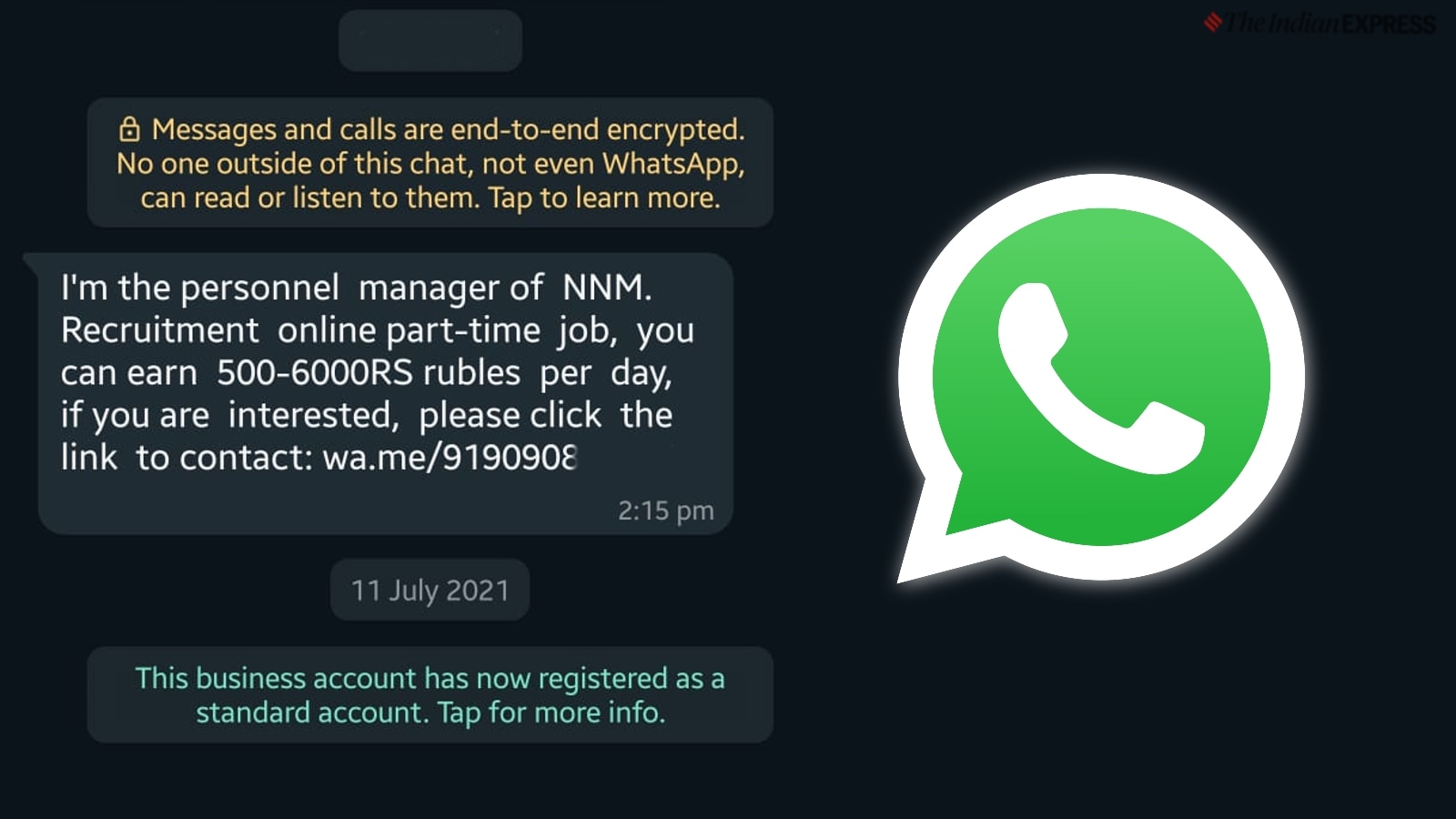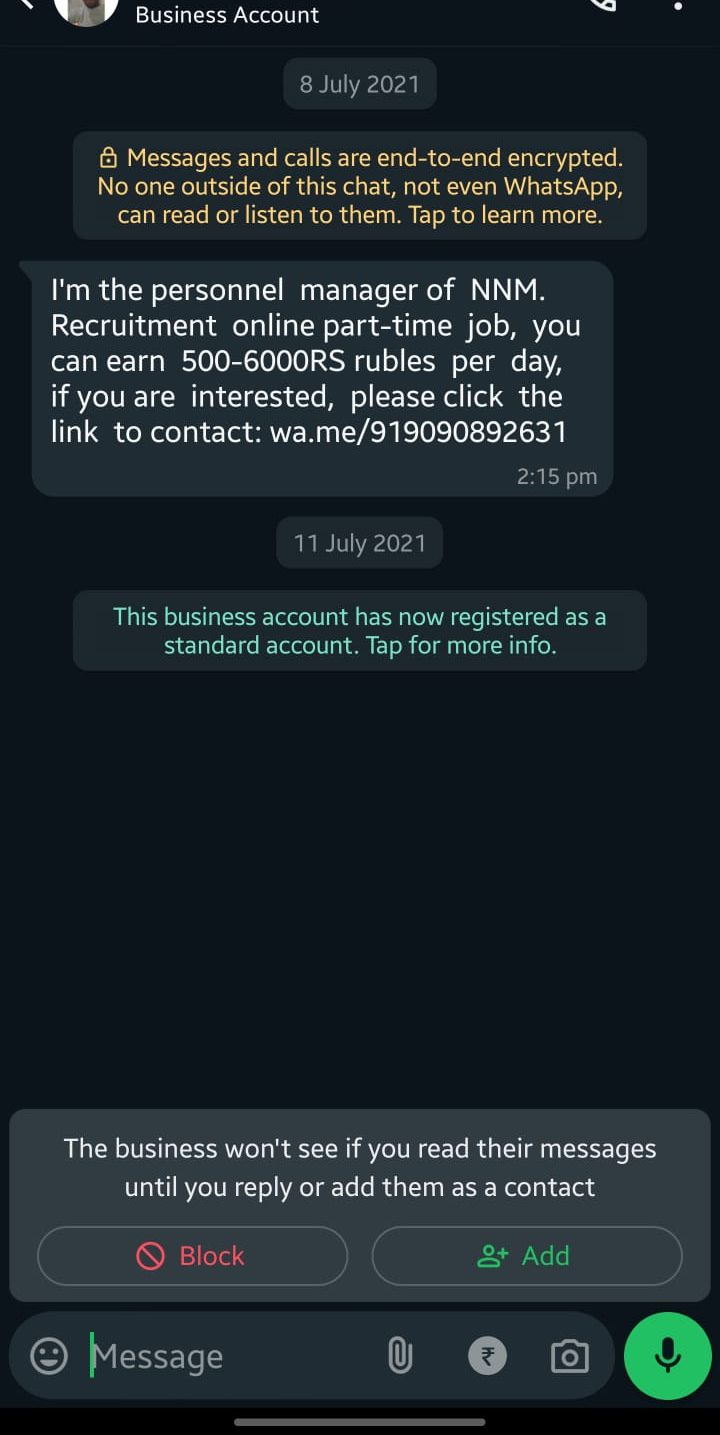How to protect yourself from recruitment scammers on WhatsApp
Got a job offer on WhatsApp? You have been served with a recruitment scam!
 WhatsApp fake job scams are on the rise. (Image credit: Vivek Umashankar/The Indian Express)
WhatsApp fake job scams are on the rise. (Image credit: Vivek Umashankar/The Indian Express)Meta’s WhatsApp has become an integral part of daily life, facilitating everything from casual greetings to updates on Amazon deliveries. It’s now a go-to platform for communication with friends, family, colleagues, and even businesses. While receiving job offers from close contacts via WhatsApp is becoming more common, if the offer comes from a business or unfamiliar entity, it’s likely a scam.
Recruitment scams on WhatsApp have surged in recent years, as it’s easier for scammers to reach strangers compared to other platforms, despite Meta’s efforts to enhance privacy and security.
What is a WhatsApp recruitment scam and how can you identify one?
 This is how a typical recruitment scam message on WhatsApp will look like. (Express Photo)
This is how a typical recruitment scam message on WhatsApp will look like. (Express Photo)
A typical WhatsApp recruitment scam begins with a message offering a lucrative “work from home” opportunity, often promising a salary much higher than what you’re currently making or expecting. The job? Something as simple as using social media on your iPhone. While tempting—especially for freshers and job seekers—this is a telltale sign of a scam.
Legitimate employers almost never contact potential hires on WhatsApp without prior communication via phone or email.
Scammers are skilled at making their offers seem genuine. They may use a profile picture of a reputable company and the individual may come across as a top executive. If you receive such a message, it’s important to verify the offer by calling the company and cross-checking the details. If anything seems off, it’s best to drop the offer.
Don’t respond to an out-of-the-blue job offer on WhatsApp
If you receive an unsolicited job offer on WhatsApp that seems too good to be true, it probably is. Being asked for personal details and being pressured to apply quickly due to “limited openings” are also red flags to watch out for. These are clear signs of a scam.
The best approach? Don’t engage with such job offers on WhatsApp and always verify the source before proceeding.
International job offers on WhatsApp
Another common type of job scam on WhatsApp are international job offers, often targeting people aspiring to work abroad. Receiving a message from an international phone number can feel exciting and surreal, but in 99 per cent of cases, it’s likely a scam. These scams typically aim to extort a few thousand rupees from victims under the guise of an “application” or “registration” fee.
Legitimate employers will never ask for money to join their company. If the job requires relocation, a real employer will usually cover the necessary arrangements. If you receive a job offer from an international number on WhatsApp, it’s best to block the contact and move on.
Don’t fall for authentic-looking job offer letters
Some scammers take it a step further by issuing official-looking offer letters on what appears to be company letterhead. However, no legitimate company will send an offer letter without conducting an interview or negotiating terms. If you receive one without prior discussions, it’s almost certainly a scam. Rather than gaining a new job, you risk losing money. Scammers often send very convincing messages, and those in desperate need of employment may overlook the red flags and fall victim.
Don’t get deceived by flexible roles/working hours
Scammers often lure victims with promises of unbeatable perks—high salaries, flexible working hours, and remote roles—all of which may seem too good to pass up. While some companies do offer these benefits, especially post-COVID, a recruiter contacting you solely through WhatsApp is likely using these promises as bait to gain your trust.
How do scammers get our details?
In today’s digital age, privacy is nearly non-existent. Phone numbers and email addresses are often sold in bulk for just a few thousand rupees. Scammers then use these lists to target large groups of people, hoping that just one or two per cent will respond. Unfortunately, those who engage are at risk of losing money.
Always trust your instincts, and double-check to ensure authenticity
No matter how compelling a job offer you receive on WhatsApp might look, make sure it’s genuine and always double-check and cross-verify if there exists such a company and if they are looking for a specific deal. If unsure, always talk to friends and family and take their opinions before pulling the trigger.







